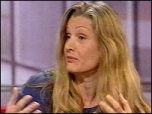 The Express reports on plans to offer “burka-style” gowns to Muslim women hospital patients:
The Express reports on plans to offer “burka-style” gowns to Muslim women hospital patients:
“Last night Conservative MP Philip Davies, who has campaigned against political correctness, said the dress would stir up resentment on wards because patients would believe others were getting special treatment…. ‘It is another example of political correctness because it is the sort of thing that has been brought in because the words “faith” and “race” have been mentioned. The average patient on a ward will look at this and be resentful because they will say to themselves: “This has been brought in because it is a Muslim request”. They themselves may have other requests, like more visiting hours, more flexible meal times or a brighter lamp for their bedside table, but they know they’ve got less chance of achieving this. A burka-style hospital gown is only high on the priority list because of the politically correct world we live in.’ … The burka is the latest move to stir debate on priorities in the hard-pressed NHS.”
Of course, the garment in question has nothing in common with a burka, but the term is presumably chosen because it has associations with Afghanistan and the Taliban.

 National MP Bob Clarkson’s mouth has landed him in trouble again after he said “Islam religion-type people” who wore burqas could be crooks hiding guns.
National MP Bob Clarkson’s mouth has landed him in trouble again after he said “Islam religion-type people” who wore burqas could be crooks hiding guns. Allison Pearson writes: “Several opinion polls have measured Muslim anger with Britain. No survey has yet recorded the rest of British society’s anger and distress with Muslims. Yet you only have to start a conversation on the subject to unleash a flood of feeling. ‘I never thought I’d say this, but…’ People who don’t consider themselves racist are wondering how to deal with these new and dismaying thoughts.”
Allison Pearson writes: “Several opinion polls have measured Muslim anger with Britain. No survey has yet recorded the rest of British society’s anger and distress with Muslims. Yet you only have to start a conversation on the subject to unleash a flood of feeling. ‘I never thought I’d say this, but…’ People who don’t consider themselves racist are wondering how to deal with these new and dismaying thoughts.” “I’ve been more and more troubled lately by the sight of veiled women swathed in heavy black, getting on with their everyday business in Britain. A woman on the bus the other day looked like she was auditioning for an Islamic version of the Blues Brothers, with the only part of her body uncovered by her drapes, hidden behind very black sunglasses….
“I’ve been more and more troubled lately by the sight of veiled women swathed in heavy black, getting on with their everyday business in Britain. A woman on the bus the other day looked like she was auditioning for an Islamic version of the Blues Brothers, with the only part of her body uncovered by her drapes, hidden behind very black sunglasses….